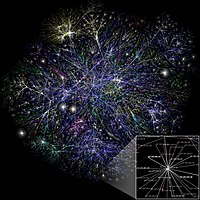 Image via Wikipedia
Image via Wikipedia
Recently, Robert Wright, journalist and author of various books including The Evolution of God and Nonzero: The Logic of Human Destiny, penned an op-ed in the New York Times in which he contemplates the Internet in all its ubiquitous (albeit Big Brotherish) glory. Wright suggests:
"...technology is weaving humans into electronic webs that resemble big brains — corporations, online hobby groups, far-flung N.G.O.s. And I personally don’t think it’s outlandish to talk about us being, increasingly, neurons in a giant superorganism..."
While Wright's rhetoric seems a bit Huxley-esque, his message in a nutshell is that the overall social impact of the Internet won't necessarily be a sinister one. Nor does Wright kowtow to technology extremists who praise the Internet as if it's the Second Coming.
While it can be difficult to see what, exactly, is so great about being another cell in a cosmic, web-like superbrain, Wright makes a compelling case that stands in stark contrast to Internet denouncements that have recently been proferred by the likes of Nicholas Carr, author of the now-infamous article, "Is Google Making Us Stupid?" (as well as an accompanying book just out--The Shallows: What the Internet is doing to Our Brains)
Wright argues that while sure, we waste a lot of time on the Internet, these temporal inefficiencies are negligible when we compare them to the incredible social efficiencies that enable any user, anywhere at any time to connect with like-minded people and to disseminate, search for, and digest information on just about anything.
For education as a whole, the implications of these efficiencies cannot be overemphasized. While some are hesitant to embrace the open education movement, let us conceptually stand for a moment at the intersection of education and the Internet. Imagine a library that is so vast, it defies mapping, a digital, ethereal, tangled web of people and information that, when properly channeled, has the ability to make self-education a reality for anyone who is willing to learn?
It is these things that we should consider before we write off the technology that some have too readily dismissed. Of course, with every technological blessing, there will be roadblocks, and with the Internet, it's minefields of frivolous distraction. But not all distractions are created equally, and sometimes it is precisely distraction that will lead to new fields of inquiry.
After all, perhaps the ultimate goal of education is to foster a passion for continued learning that extends beyond formal schooling, no matter what the subject. And no one can deny that the Internet is perhaps the one medium that has most furthered this goal for the greatest amount of people globally.
This guest post is contributed by Kate Cunningham, who writes on the topics of online university rankings. She welcomes your questions and comments at her email Id: cn.kate1@gmail.com.

No comments:
Post a Comment